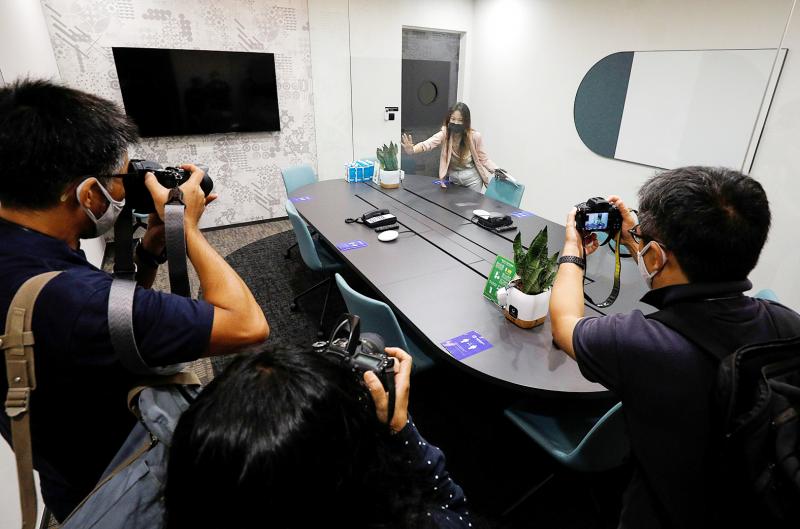Singapore has launched a travel “bubble” business hotel that allows executives to hold face-to-face meetings without a risk of exposure to COVID-19, one of the world’s first such facilities.
The Connect@Changi hotel has meeting rooms outfitted with airtight glass panels to reduce the risk of transmission, and even has a special compartment with ultraviolet light to sanitize documents so they can be shared between participants.
Some of its first guests have traveled from France, Germany, Indonesia and the United Arab Emirates.

Photo: Reuters
“Given that we have operations in Singapore, I need to be able to travel to conduct face-to-face meetings with the team based in Singapore, as well as process some paperwork,” said Olivier Leroux, who was among the first guests when he checked in on Monday after his flight from France.
The hotel differs from quarantine hotels in the city-state, where guests are isolated for two weeks and must pass COVID-19 tests before being cleared to leave.
Visitors to the bubble hotel are not permitted to enter Singapore and must leave via the airport.
Singapore is expected to host the World Economic Forum in August and the new bubble hotel has been put forward as a way to facilitate business meetings during the event.
The room rate starts at S$384 (US$285) per night, which includes meals, two-way airport transfer and COVID-19 tests required during the course of the stay.
Due to strictly enforced curbs and quarantine measures, Singapore has kept a tight lid on its COVID-19 infections, despite clusters emerging last year in dormitories housing migrant workers.

South Korea’s equity benchmark yesterday crossed a new milestone just a month after surpassing the once-unthinkable 5,000 mark as surging global memory demand powers the country’s biggest chipmakers. The KOSPI advanced as much as 2.6 percent to a record 6,123, with Samsung Electronics Co and SK Hynix Inc each gaining more than 2 percent. With the benchmark now up 45 percent this year, South Korea’s stock market capitalization has also moved past France’s, following last month’s overtaking of Germany’s. Long overlooked by foreign funds, despite being undervalued, South Korean stocks have now emerged as clear winners in the global market. The so-called “artificial intelligence

‘SEISMIC SHIFT’: The researcher forecast there would be about 1.1 billion mobile shipments this year, down from 1.26 billion the prior year and erasing years of gains The global smartphone market is expected to contract 12.9 percent this year due to the unprecedented memorychip shortage, marking “a crisis like no other,” researcher International Data Corp (IDC) said. The new forecast, a dramatic revision down from earlier estimates, gives the latest accounting of the ongoing memory crunch that is affecting every corner of the electronics industry. The demand for advanced memory to power artificial intelligence (AI) tasks has drained global supply until well into next year and jeopardizes the business model of many smartphone makers. IDC forecast about 1.1 billion mobile shipments this year, down from 1.26 billion the prior

People stand in a Pokemon store in Tokyo on Thursday. One of the world highest-grossing franchises is celebrated its 30th anniversary yesterday.

Chinese artificial intelligence (AI) start-up DeepSeek’s (深度求索) latest AI model, set to be released as soon as next week, was trained on Nvidia Corp’s most advanced AI chip, the Blackwell, a senior official of US President Donald Trump’s administration said on Monday, in what could represent a violation of US export controls. The US believes DeepSeek will remove the technical indicators that might reveal its use of American AI chips, the official said, adding that the Blackwells are likely clustered at its data center in Inner Mongolia, an autonomous region of China. The person declined to say how the US government received